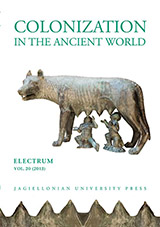Corinth after 44 BC: Ethnical and Cultural Changes
Corinth after 44 BC: Ethnical and Cultural Changes
Author(s): Marcin N. PawlakSubject(s): History
Published by: Wydawnictwo Uniwersytetu Jagiellońskiego
Keywords: Roman Greece; Roman Corinth; “Hellenisation” of Roman Corinth
Summary/Abstract: A few months before his death, Caesar decided to establish a Roman colony on the spot where Corinth, destroyed in 146 BC, used to lie. The population of Roman Corinth was ethnically and socially diverse from the very beginning. This, however, does not change the fact that the city was a Roman colony, whose offi cial name was Colonia Laus Iulia Corinthiensis. With time, natural demographic processes started to take place, which on the one hand increased the original diversity, and on the other hand reinforced the strongest element of this diversity, i.e. Greekness. In this article, the author tries to answer the often-asked question about the circumstances in which Corinth – a Roman colony – started to be perceived as a hellenised city. What exactly does the “hellenisation” of Corinth mean and how does it show?
Journal: Electrum. Studia z historii starożytnej
- Issue Year: 2013
- Issue No: 20
- Page Range: 143–162
- Page Count: 20
- Language: English

